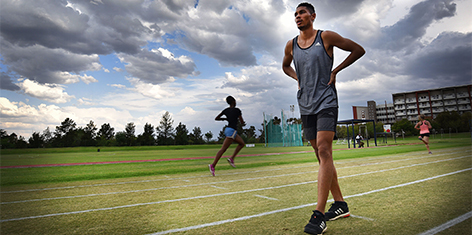
Wayde van Niekerk knows he has to work even harder in 2016 if he wants to achieve success at the Olympic Games in Rio de Janeiro. Photo: Charl Devenish
When he was still in primary school, Wayde’s dream destination was Brazil. Even his dog’s name is Rio.
So it almost seems written in the stars for Wayde van Niekerk to take part in the 2016 Olympic Games in Rio de Janerio.
According to the 400m athlete of the University of the Free State (UFS), the Olympics has been something he has been dreaming about for years.
Van Niekerk, who studies BA Marketing at the UFS, has had a phenomenal 2015 season, and the whole of South Africa hopes he can repeat his outstanding form in Rio. The Olympics will be held from 5-21 August 2016.
Funny story
“It actually is a funny story. You know when you are in primary school, and the teacher says you have to write down your dream destination. Mine was Brazil,” Van Niekerk revealed.
“In 2012 at the closing ceremony of the London Olympics, I saw they introduced Rio as the next hosting country, and I thought Wow! That is where I want to be, and what I want to do.
“That opened my eyes and I knew God has a plan for me. I have to put in the hard work and achieve something with my life. Luckily from there on, there was pure growth in my life and I am grateful for that.”
His dream is also carried by his dog, Rio, a husky he got about two years ago.
Preparation in 2016
Van Niekerk will follow a specific programme leading up to Rio 2016.
In February next year, he will still be taking things easy, but will probably compete for the UFS in the Varsity Sports athletics.
“You have to build up slowly to peak at the right time,” he said.
In June 2016, he will start competing internationally in Jamaica, then New York, the All-Africa Games in Durban, and then, some Diamond League events before the Olympics in August.
In the archive:
KovsieSport star
NBC tells waydes story
Wayde nominated as SAs best
Wayde Adidas face
Wayde’s hat trick of awards
Congratulate wayde and other achievers
Wayde wins gold
Kovsie trailblazing track runner
Kovsie gold medalist
Kovsie Campion sprinter
Wayde sets African record
Kovsies keep winning, this time in athletics